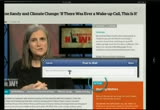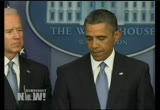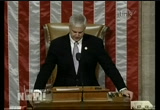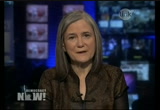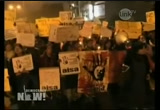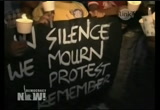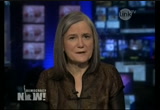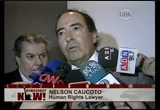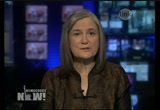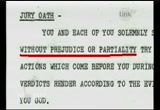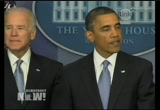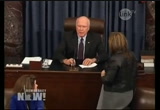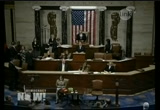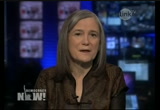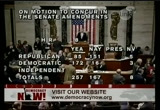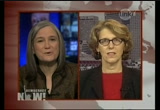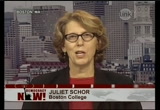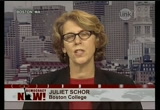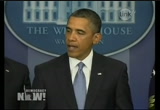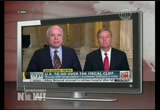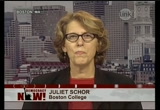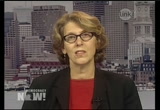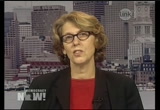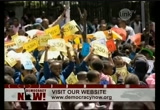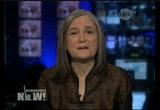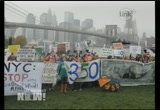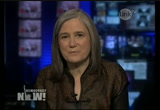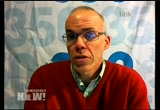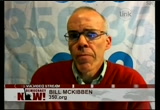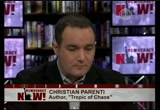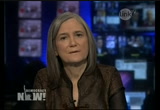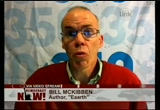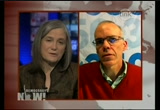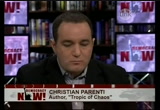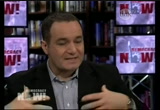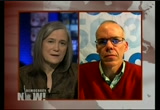tv Democracy Now LINKTV January 2, 2013 3:00pm-4:00pm PST
3:00 pm
01/02/13 01/02/13 [captioning made possible by democracy now!] >> from pacifica, this is "democracy now!" >> the nays are 8. the bill as amended is passed. >> today's agreement, the law will remain in place as long as i'm president rid the deficit needs to be produced in a way that is balanced. everyone pays their fair share. everyone does their part. that is our economy works best. >> after much drama, the so-
3:01 pm
called fiscal cliff has been averted for now. we will look at what is in the senate approved by the house late last night. we will speak with economist juliet schor. after years of extreme weather, will 2013 be year zero in the battle over climate change? >> we're closer now them have ever been to what we need to do. i think we peeled away the layers of the onion and have gotten to the heart of things. as of tonight, we're going after the fossil fuel industries. [applause] >> will host a discussion between bill mckibben, founder of 350.org, and journalist christian parenti. he is author of "tropic of chaos: climate change and the new geography of violence." >> if the government allowed the epa to do what it must do, raise
3:02 pm
the price of burning fossil fuels, that would help direct private money into renewable energy, help put people back to work. in the face of this crisis, we have to think seriously and creatively about the role of government. >> all of that and more coming up. this is "democracy now!," democracynow.org, the war and peace report. i'm amy goodman. president obama is expected to sign the bill to deter the brunt of tax hikes and spending cuts known as the fiscal cliff that took effect at midnight yesterday. the compromise bill passed by the house late tuesday makes bush tax cuts permanent for about 99% of households. it allows tax increases of about 5% only on incomes above $400,000 for individuals or $450,000 for couples. the deal extends unemployment benefits, renews tax credits geared toward low-income families, and delays automatic
3:03 pm
cuts for military and other spending for two months. president obama compromised on the tax issue after initially backing increases on family incomes of more than $250,000. speaking tuesday at the white house, obama claimed the deal is a victory. >> the central premise of my campaign for president was to change the tax code that was too skewed toward the wealthy and the expense of working middle class americans. tonight, we have done that. thanks to the votes of democrats and republicans in congress, i will sign a law that raises taxi -- taxes on the wealthiest 2 percent of americans while preventing a middle-class tax hike that could have sent us back into recession and had a severe impact on families all across america. >> house republicans initially condemned the compromise bill for not cutting deeply enough into social programs. still, 85 republicans backed the bill, bringing the final tally in the house to 257 in favor
3:04 pm
with 167 voting against the compromise followed tense negotiations between republicans and democratic leaders. we'll have more after the headlines with economist juliet schor. house republicans have reversed their pledge to take up in emergency aid bill this week for states devastated by superstorm sandy. the move potentially leaves the $60 billion aid package to die at the end of the legislative session on thursday. the house was expected to consider the bill today, but dropped it following lengthy talks on the fiscal cliff. the decision drew harsh condemnation from both sides of the aisle. republican congressmember michael grimm of staten island, one of the areas hardest hit by city, said -- democratic congressmember jerry nadler of new york city blasted his colleagues for failing to take urgent action. >> hurricane sandy struck on
3:05 pm
october 29. nine weeks ago. it is unprecedented that it takes so long. i can understand -- i would not sympathize -- but i can understand with members to my said the amount requested is too much, we should change it, debate it. fine. but to ignore it? to ignore the plight of millions of american citizens? unprecedented, disgusting, unworthy of the leadership of this house. they should reconsider or hang their heads in shame, mr. speaker. >> president obama has signed into law an extension of the federal government's sweeping powers to conduct warrantless wiretapping. the foreign intelligence surveillance act allows for the monitoring of domestic phone calls and emails as long as one of the partisan the communication is outside the u.s. the controversial program was set to expire at the end of 2012, but has now been renewed for another five years. it will drag -- and oil drilling
3:06 pm
rig belonging to shell has run aground on the island in the gulf of alaska providing what environmentalist say is further proof of the perils of arctic oil drilling. the rig hit shore monday night after crew members towing the vessel were forced to disconnect it amid stormy weather. concerns mounted over possible spill of diesel fuel and other contaminants on board. the crew previously had been evacuated. the director of the pin from the group's u.s. arctic program, said the incident -- anti-rape protests are continuing in india after the death of a 23-year-old student who was gang raped on a moving bus in new delhi. the woman's ashes were scattered in the ganges river tuesday and many of the country's beer celebrations were canceled after she succumbed to injuries sustained in the attack.
3:07 pm
the case has sparked a nationwide call for reforms to increase punishment for rapists and prevent legal cases from languishing. hundreds of thousands of people took part in a candlelight vigil to honor the victim and call for the six suspects to be punished. >> being a woman, i see it is not just about these six people -- it is about child abuse, domestic violence, rape, molestation. a very simple thing that we can do, both men and women, is we need to raise our voices. >> the gang rape case has shone a light on other instances of sexual violence in india or one woman is raped every 20 minutes according to the national crime registry. syrian government forces are reportedly battling with rebels opposed to president bashar al- assad near an airport in the northern province of idlib.
3:08 pm
the violence comes a day after opposition groups say 75 people were killed across the country. on tuesday, government airstrikes rebel-held areas of aleppo as clashes forced the city's airports to shut down. heavy fighting was also reported terror -- near damascus. on sunday, lakhdar brahimi warned syria's crisis is deepening. >> the situation in syria is very bad, very, very bad. the differences are increasing. and that there needs to be a political solution. tbilisi syrian people and give them their rights. their legal rights or syria will turn into -- >> two policeman in bahrain have been sentenced to seven years in jail for beating an opposition member to death. the victim was the founder of an independent newspaper. he died in custody in april
3:09 pm
2011. bahrain held fresh anti- government protests this week despite an ongoing crackdown against demonstrators. for rain is home to the navy's fifth fleet. and ivory coast, a 61 people were crushed to death in a stampede following a new year's fireworks show. witnesses said police tried to control a crowd of thousands pouring out of the stadium. scores of people were injured, most of the dead were children and teenagers. the fireworks display was to celebrate peace after months of violence following disputed elections in 2011. seven aid workers have been shot dead in pakistan in what appears to be the latest case of militants targeting health- related groups. last month at least nine volunteers with a polio vaccination drive were killed across pakistan. opposition to health efforts has spread after the cia used a fake vaccination program to help fight osama bin laden. five of the workers killed in tuesday's attack or young women who worked as educators.
3:10 pm
the remaining two were help workers. a new tally shows the number of civilians killed in iraq rose in 2012 for the first time in three years. the british-based group iraq body count says about 4500 civilians were killed in violence last year. the group said in a statement -- iraq body counts figure is more than twice the number given by iraqi officials who claim violence is actually dropping. on monday, at least 23 people were killed, 87 wounded in a series of attacks across iraq. no. 3 leader kim jong un has called for harmony with south korea in a rare televised address. in a speech broadcast on new year's day, he made no mention of the country's controversial nuclear program and said the economy is north korea's top priority. >> an important issue of
3:11 pm
putting into the division of the country and achieving unification is to remove confrontation between north and south. the records show the confrontation between fellow countrymen leads to nothing but war. >> in chile, eight for me -- eight former army officers have been charged for their role in the murder of protest singer victor jara nearly four years ago. jara was arrested and tortured after the u.s.-backed overthrow of elected president salvador allende in 1973. a chilean judge has ordered the arrest of two officers believed to of committed the murder and six others who allegedly acted as accomplices. >> it is historical for this country when people like victor jara and the other victims of the dictatorship can have this possibility that a judge can reach this level of the process
3:12 pm
and pinpoint responsibility of the army officials. >> in bolivia has nationalized the operations of spain's largest utility company, iberdrola. buildings occupied by the energy firm were seized by bolivian authorities last recalling orders by president morales. he said the move was necessary to ensure equality. what we consider this measure necessary. so that the quality of electricity service is uniform in the urban and rural areas. this measure guarantees equality to the citizens who live in the rural areas and in shares of income with equality and uniform service. venezuelan vice president nicolas murder has visited president hugo chávez in cuba were his is suffering complications after recent cancer surgery. in an interview, he attempted to assuage rumors about the president's health, but gave little specific information about his condition.
3:13 pm
>> during these days, i was able to see president hugo chávez twice and speak with him. his complete conscious of his post operative state and he expressly asked us to keep the print alt informed, always with the truth, regardless of how hard it may be. >> pope benedict spoke to thousands of dollars in the vatican tuesday on a day recognized by the catholic church as a world day of peace. the poll also addressed the issue of economic inequality. >> although the world is unfortunately still marked as a hotbed of tension and conflict caused by growing inequalities between rich and poor, from the dominance of a selfish and the individual mentality, also expressed by an unregulated financial capitalism as well as various forms of terrorism and crime, i am convinced that the many works of peace, which are abundant in the world, testified
3:14 pm
to the deep sense of humanity and peace. >> in new york, a woman has been charged with murder as a hate crime after allegedly pushing a man to his death on the subway tracks because she believed he was muslim or hindu. erika menendez reportedly told authorities -- the victim, 46-year-old susnando sen, was a hindu born in india. a wisconsin state senator is drawing ire for his comments against the holiday of kwanzaa. republican state senator glenn grothman released a statement titled, "why must we still care about kwanzaa?" the comments drew outrage from local democratic leader meg moen who called them dog dropping and said --
3:15 pm
in a victory for civil rights advocates, north carolina governor bev perdue has issued pardons of innocence for the wilmington 10. the group of mostly african- american activists were falsely convicted and imprisoned for the firebombing of a white-owned store in the 1970's. their pardons in the waning days of perdue's administration follow a campaign to unequivocally vindicate the wilmington 10 after their convictions were overturned by a federal court decades ago. newly service documents show the prosecutor in the case made racially based notes next to potential jurors, writing comments like "kkk good" and "and uncle tom type." in a statement about the wilmington 10, the governor said --
3:16 pm
wilmington 10 member benjamin chavis appeared on "democracy now!" the street to talk about what a pardon of innocence would mean. >> the pardon of innocence would mean that the state of north carolina finally realizes the trial, the unjust arrest charges were all racially motivated, politically motivated. it is time, 40 years later, for the state to remove this from the community of wilmington 10 and from the state itself. it has been an albatross around the states that for over 40 years. >> sleeting environmentalist rebecca tarbotton has died at the age of 39. she was his executive director of the rainforest action network and an advocate for human rights. she died in a swimming accident in mexico while on vacation. rainforest action network said in a release --
3:17 pm
rebecca tarbotton appeared on "democracy now!" in may to talk about the campaign against bank of america. >> we are involved specifically with bank of america because climate change is the most real and present danger we have to the environment and the people all around the country and around the world. bank of america is the lead finance here in the country. coal-fired power plants, for instance, are the largest source of greenhouse gas emissions which is the cause of climate change in climate chaos. we're here specifically to say, look, you need to get out of coal if any of us are serious about transitioning out of fossil fuels and into renewable energies. >> rebecca tarbotton, died at the age of 39, director of the rainforest action network, and a swimming accident in mexico. those are some of the headlines. this is "democracy now!," democracynow.org, the war and
3:18 pm
peace report. i'm amy goodman with nermeen shaikh. >> welcome to all our listeners and viewers from around the country and around the world. after much drama, the so-called fiscal cliff has come to an end. for now. late tuesday night, the republican-led house voted to approve the deal. that came after the democratic- led senate voted early tuesday to pass the measure. the move came nearly 24 hours after a decade's worth of tax cuts expired with the stroke of the new year. technically raising taxes by more than $500 billion in 2013. shortly after last night's vote, president obama described the deal. >> under this law, more than 98% of americans and 97% of small businesses will not see their income taxes go up. millions of families will continue to receive tax credits to help raise their kids and send them to college. companies will continue to receive tax credits for the research they do, the investments they make, and the
3:19 pm
clean energy jobs they create. 2 million americans who were out of work, but out there looking, pounding the pavement every day, will continue to receive unemployment benefits as long as they are actively looking for a job. but i think we all recognize this lot is just one step in the broader effort to strengthen our economy and broaden our opportunity for everyone. the fact is, the deficit is still too high. and we are still investing too little in the things that we need for the economy to grow as fast as it should. >> the deal lays the groundwork for future battles between democrats and republicans over decisions on federal spending and debt. obama told congress he expected them to approve an increase in the nation's borrowing authority in the coming months, as well as director attention to other issues that have fallen by the wayside during the fiscal cliff hanger. >> today's agreement enshrines the principle into law i think
3:20 pm
will remain in place as long as i'm president. the deficit needs to be reduced in a way that is balanced. everyone pays their fair share. everyone does their part. that is our our economy works best. we can settle this debate, or the very least, not allowed to be so all consuming all the time that it stops us from meeting up host of other challenges we face like reading jobs, boosting incomes, fixing our infrastructure, fixing our immigration system, protecting our planet from harmful effects of climate change, boosting domestic energy production, protecting our kids from the horrors of gun violence. >> the new year's day a vote to approve the fiscal cliff deal was a reversal for house republicans who had opposed it for not cutting deeply enough into social programs. house speaker john boehner backed the deal, but many of his top lieutenants voted against it, including majority leader eric cantor. some democrats oppose the deal. in the senate, iowa democrat tom
3:21 pm
harkin was one of eight senators who voted against it. >> i am not saying everything this deal is bad. there are some good parts to this. but i repeat, i am concerned about this constant drift bit by bit, deal by deal toward more deficits, less job creation, more and fairness, less economic justice. a society where the gap goes wider between the few who have much in the many who have too little. so, mr. president, for these reasons, i must in good conscience vote no on this bill. >> despite passage of the deal, many in the u.s. was the tax increase after the expiration of the payroll tax cut enacted in 2011. when we come back from the break, we will be joined by a boston economist juliet schor. this is "democracy now!," democracynow.org, the war and peace report. i'm amy goodman. back in a minute. ♪ [music break]
3:23 pm
>> "unsatisfied." this is "democracy now!," democracynow.org, the war and peace report. i'm amy goodman with nermeen shaikh. our guest is juliet schor, economists, sociologists from boston college. she is author of, "true wealth: how and why millions of americans are creating a time- rich, ecologically light, small- scale, high-satisfaction economy." the book was originally published under the title, "plentitude: the new economics of true wealth." vote hasear's day taken place after much drama, the so-called fiscal cliff has come to an end -- at least for now. the house voted to approve the senate bill tuesday night. juliet schor, your response? >> it is not a great deal. i think one of the big problems with it is that it asks the
3:24 pm
middle-class and the port of pay for deficits they had no hand in creating. 77% of all households will be paying more on this deal, an average of $1,635 a year. that is the first point. it is a deal that as president obama just said, asks everyone to pay. but that in an of itself i think is a problem. it is the top percent that has benefited from the tax cuts of the bush era that drove the economy into recession, which is responsible for part of the deficit. it is a small segment of the political class, really, that dragged us into war in iraq and afghanistan, and that is another big part of the deficit. so the cost is falling on the wrong group, in my opinion.
3:25 pm
>> some critics have said it would have been better to go off the fiscal cliff. first of all, was there a cliff? would you agree with that criticism? >> i do agree it would have been better to go off the cliff, in large part because it really was not a cliff. the term fiscal cliff was coined by ben bernanke. ben bernanke did not want us or did not want the country to get into the situation of higher taxes -- in large part, i think that would have made his job even harder because the higher taxes would have flowed -- slowed down the economy and there would have been even more pressure on the fed to engage in monetary easing, quantitative easing as it is called. the fed really cannot do all of that much more than it is doing. interest rates are at historic
3:26 pm
lows. bernanke did not want tax increases, so he was trying to control or affect what was going to be happening on the fiscal side. it was really more of a ramped than a cliff in the sense that the sequester cuts -- we will talk format that i'm sure -- but the automatic cuts that were put in place with the debt ceiling deal of the summer actually would come into play well into the year and some near the end of the year. there was or there is quite a bit of time on that. the tax rate increases, i think very few people actually felt there would be a major income tax increases on 98% of the population. to make, that was always a bit of a red herring. if the senate and house came to a deal a month into the year
3:27 pm
rather than on the first day of the year, that would have been fine. >> you mentioned sequester cuts, juliet schor. what exactly are sequester cuts? can you talk about the specific impact of the deal on medicare and medicaid? >> well, in the summer when the fight over the debt ceiling happened, there was a small group from congress that was a -- was supposed to come up with the deal on cutting the deficit before the end of the year and they did not. that was pretty predictable. so what congress did and the president, they sort of tied themselves to the math. they said, ok, if we cannot come up with a deal, there are going to be automatic spending cuts of $1.25 trillion over 10 years
3:28 pm
that begin january 2013. and those spending cuts were divided equally between military -- or what they call ended securities -- that is also homeland security and other associated kinds of cuts. and nonmilitary. and thus did not or do not include medicare, social security and benefits for veterans, but all other spending federally is in there. some medicaid, farm aid, programs on the port, energy programs, etc. those cuts are between those two areas. that is part of the kicking the can down the road. it just happened because they have agreed to put off those cuts for 60 days.
3:29 pm
a big part of that sequestration deal or what people are thinking about that is it is not going to happen. the reasone s not going to happen, i think, is mostly because very few in congress have the spine to do what i think those of us on the progress of side of the aisle would like, and that is those major cuts in military. the >> i want to play a clip of president obama speaking last night after the house voted to approve the debt deal. >> demonstrated throughout the past several weeks that i am very open to compromise. i agree with democrats and republicans that the aging population and the rising cost of health care makes medicare the biggest contributor to our deficit. i believe we have to find ways to reform the program without hurting seniors who count on it to survive. i believe there's further unnecessary spending in
3:30 pm
government that we can eliminate. but we cannot simply cut our way to prosperity. cutting spending has to go hand in hand with further reforms to our tax code so that the wealthiest corporations and individuals cannot take advantage of loopholes and deductions that are not available to most americans. >> this will be taken up in a few months. juliet schor, what is one happen to medicare/medicaid, social security? >> it is hard say, but i think given the president has already put these on the table, already indicated a willingness to go to the cpi, many changing the way it is calculated for benefits in the social security program, that i think it is likely social security and medicare will be back on the table. it is unfortunate because the democrats negotiated quite a
3:31 pm
good deal with the sequestered deal. they are off the table. social security is not part of the problem of the deficit. it is a fiscally solvent program. it is solvent until 2013. we should not be talking about social security at all. medicare is another story. but on the other hand, maybe we should be waiting to see what happens with the health care program and how that plays out in terms of cost before we make dramatic changes to a program that people are, by and large, very satisfied with. we need to be talking about things that are not in the conversation right now. we also need to be talking about cutting those military expenditures a lot more. i think one of the reasons, my feeling, the democrats are not
3:32 pm
going to get a good deal 60 days from now is that republicans know they don't have much of a spine for cutting military spending. but if they did, i think they to get a pretty good deal -- at least a much better deal than what it looks like they're going to get right now. >> republican senator lindsey graham voted to approve the fiscal cliff deal was just one day before the vote he told fox news sunday he may vote no unless it included more cuts to social security benefits. >> i'm not one to raise the debt ceiling unless to get serious about keeping the country from becoming -- cutting social to treat medicare. i want meaningful and atomic reform. not to take a voucher approach to medicaid. adjust the age for social security, cpi changes, and look behind the 10-year window. i cannot raise the debt ceiling in good conscience without addressing the long-term debt problems of this country, and i
3:33 pm
will not. >> that was senator lindsey graham greene another republican senator voted yes, john mccain of arizona. senator mccain said republicans would block another deal unless it included major cuts to so- called entitlement programs. he was interviewed by cnn possible blitzer. >> are you gandhi is the raising of the debt ceiling as leverage to get from the president? >> i think there's going to be a whole new field of battle with the debt ceiling rolls around. most of us have pledged before we voted in to raise the debt ceiling, even though it may be at political cost, we have to address spending. that means entitlements. we have to sit down to gather and get us back on a path. look, we just added $2.1 trillion in the last increase of the debt ceiling, and spending
3:34 pm
continues to go up. i think there's going to be a pretty big showdown the next time around. >> juliet schor, that senator john mccain. can you explain the significance of the republican push to raise the retirement age and how are people organizing around this? >> republicans have been trying to cut undermined, reduce, get rid of social security for decades and decades. it iss pretty much a constant. what i think is troubling about the current period, we also have a president now that is put pretty significant concessions and cuts to social security on the table because he has not only offered the changes in the inflation adjustment, but he also has talked about raising the age of retirement -- which
3:35 pm
is a terrible idea. >> why is it a terrible idea? >> well, because there are a lot of people in this country who need and want to retire at 65. and to make that change, for no reason -- social security is not in a fiscal crisis. it does not have a fiscal problem. it is not running out of money. it does not contribute to the deficit. it is a total red herring in this debate. the republicans are trying to chip away piece by piece at this. it is particularly bad idea for people who do physical labor, manual labor, because those two extra years are very difficult for people. i think -- we have got to look at this in terms of the fact
3:36 pm
that it is really a fraud. the republicans want to do this not because of the deficit -- the deficit is coming down as a fraction of gdp. it is not caused by social security. it is caused by the downturn, the bush tax cuts, and the wars. that is the first thing. there is no danger of the united states becoming greece. that is another fraudulent metaphor. the u.s. has no problem financing its deficit. the only problem it has financing its deficit are republicans who threatened to hold up the debt ceiling. spending will increase because the size of the economy is increasing. the size of federal spending will then increase. but republicans are basically back in the 19th century. they're not accepting the 20th
3:37 pm
century happened. they're not accepting the role of the modern welfare state. i think as paul krugman noted a little while ago, and is obviouv to most economists, this is a good time to be running deficits not just for the standard reasons, the economy is weak and and have a lot of people unemployed, but because the cost of borrowing is so low. it is historic fleet low. it is a good time to borrow money, but to use that money to spend on the things the country needs. i think this is one of the pointsbama made in one of the clips you just ran that i really agree with, which is the government needs to be spending to do the things the country needs. we need to be spending, shifting into a clean energy paradigm. >> on that note, juliet schor, quickly, we have 20 seconds.
3:38 pm
you said carbon tax was something that should have been included. can you talk about the significance of that before we conclude? >> absolutely. the cliff we're going over is the climate cliff. putting a tax on carbon, about $20 to $25 per pound of co2, could raise about $125 billion. it is and out of the box solution in the sense a gets us 'ut of just the things we're talking about. it is a revenue raiser that creates a lot of good things, more labor intensive jobs in the economy, helps us on climate. i think that is really where the democrats need to be focusing for the next deal, not on cutting social security and other welfare entitlements. >> juliet schor, thank you for being with us, author of, "true wealth: how and why millions of
3:39 pm
americans are creating a time- rich, ecologically light, small- scale, high-satisfaction economy." this is "democracy now!," democracynow.org, the war and peace report. i'm amy goodman. when we come back, we will talk about climate change with christian parenti and bill mckibben, just chosen as vermonter of the year. stay with us. ♪ [music break]
3:40 pm
3:41 pm
play guitar before he was shot more than 40 times. this is "democracy now!," democracynow.org, the war and peace report. i'm amy goodman with nermeen shaikh. >> we turn to a conversation about global warming and how to confront it. some have called 2013 year zero in the battle over climate change. this comes as 2012 was the year of extreme weather from the melting of the arctic to superstorm sandy, to the massive typhoon in the philippines. it was also the warmest year on record in the u.s., with massive droughts and frequent wildfires. in the presidential debates, neither of the major party candidates took on climate change. right after the election, environmentalist bill mckibben and the group 350.org hit the road to confront the fossil fuel industry. what he calls "public enemy number one to the survival of our planetary civilization." the tour has since ended, but the fossil fuel divestment campaign it launched is growing. college students on more than
3:42 pm
190 campuses are calling on their universities to pull endowments -- estimated at a total of $400 billion -- out of the fossil fuel industry. unity college in maine and hampshire college in massachusetts have already taken action. the unity college president stephen mulkey explain the decision in part by saying -- at harvard, the school the country's largest endowment, 72% of students voted in favor of divesting from fossil fuels, but officials have pushed back. the mayor of seattle has called on his city to strip fossil fuels from its two main pension funds, and democratic senator sheldon whitehouse of rhode island raised the campaign and a speech from the senate floor last month. >> as i have said in previous speeches, we are sleepwalking.
3:43 pm
as congress sleepwalks, americans are taking action on their own incarnation of the nonprofit organization 350.org, for example, students and more than 150 colleges and universities across the country are pressing as institutions to sell off portions of their endowment portfolios that are invested in fossil fuel companies. the students are employing a stool -- employing there's schools and divest from the polluters. this type of campaign was employed effectively in the 1980's to pull investments from south africa during apartheid. american college in university endowments estimating $400 billion, this movement by students deserves significant attention. >> democratic senator sheldon whitehouse of rhode island speaking last month. in light of the weak climate deal reached at the united nations climate change conference last month in doha,
3:44 pm
many environmentalist have lock on the fossil fuel divestment campaign as the new frontier in their activism rid they sit in the same spirit as the ongoing campaign of nonviolent civil against keystone xlg pipeline. christian parenti recently wrote, "problems with the math." we're joined by bill mckibben of 350.org and christian parenti. bill was just voted for montter of the year, author of "eaarth: making a life on a tough new planet." he joins us via videostream from his home in vermont christian parenti is author of, "tropic of chaos: climate change and the new geography of violence." we welcome you both to "democracy now!"
3:45 pm
you, bill. with can you lay out this campaign that 350.org has launched around the country? >> sure. let me say, in this case, 350 and the other groups we're working with are more of the vector than the virus. these are release students and campuses around the country and others following their lead the mayor of seattle, religious denominations. people no longer want to be profiting from the wreckage of the climate, and to understand not that we can bankrupt exxon -- we cannot -- but we can put a ding in their public image, that we can begin to do to them that say happened to the tobacco industry. that is the reason i think desmond tutu was so pleased to hear this work was going on. he filmed a video we showed at the 22 big sold out evening events in city after city after
3:46 pm
city. he said, you know, climate change is the great moral issue since apartheid and we need the same kind of tools to bring it to people's attention. we badly need governments to act, but of course governments have not acted over the last 25 years, despite the huge efforts of many of us to get them to act. one of the reasons is, the power of the fossil fuel industry in our political system is so great that governments are constrained, not just in washington, but capitals around the world. we're trying to change the political dynamics. we are trying to really take on the fossil fuel industry, and demonstrate the sort of core of this which is a one piece i wrote last summer for "rolling stone," that went all the bavaro. it demonstrates the fossil fuel industry has in its reserves five times the amount of carbon that even the most conservative
3:47 pm
governments think would be safe to burn. in other words, they are out law against the laws of physics. we've got to put them on the defensive. that is what the fight is about. that is why it is good news this has suddenly turned into the largest student movement in a very long time. >> christian parenti, you have been critical of this campaign for divestment. can you explain why? >> i am really glad to see this wave of activism, but i wrote a piece questioning some of what was in the early roll out of this, that this divestment campaign was taking the fight directly to the corporations and hitting the bottom line. first of all, 350.org and other groups have been doing great work that already took the fight to the corporations. my argument is, by focusing on divestment, you do not take the fight closer to the corporations but to the board of trustees. i am not against the divestment
3:48 pm
campaign. but how does the divestment campaign turning political spectruspectacle? it is not one heard these bottom-line. a fossil fuel companies make money by selling fossil fuel. many do not even sell stock. koch industries is a privately- held company. if the universities all the best, what might this do? it might lower the price of stock a little, but that will not hurt the profitability. there is a way in which early on was an element of mass education and intentionally involved in this. i think one thing progressive movements can guarantee good political education. we have to be realistic about what the investment will achieve. you have the direct impact of lowering the stock prices of fossil fuel companies. what will that do? i don't think it will hurt them that much. yet the indirect aspect,
3:49 pm
students mobilizing. how can that be turned into real political power? ultimately, and i don't how exactly, i think it comes down to state action. you look at the apartheid movement, the tobacco campaign. ultimately, what happens is that governments stepped in in the anti-apartheid struggle. 25 states imposed trade sanctions on africa. reagan tried to veto it, but was overridden by the senate. that turns the tide. tobacco. when people stop smoking? when states started banning the sale and use of tobacco. that is when people started quitting in the profits started going down. we have to be realistic about the limits and wrote possibilities of divestment are. >> your response? >> i think he got it right in his original article in "the nation's." this is not a complete strategy. it is not. this is the biggest problem we
3:50 pm
have ever faced, climate change, and there are lots of things we have to do. this is a very powerful one. when nelson mandela got out of prison, his first trip was to the u.s. he did not go to the white house, but the university of california to think students there, the development of $3 billion worth of stock in companies that did business with apartheid. big companies that you cannot put out of business like general electorate, but made some change. the tobacco analogy is a good one. i think he may have misspoke when he said smoking was down with states banned the use of tobacco. most states banned the use of tobacco, but when we did change the conversation in profound ways. eventually, one public opinion leaves, then states follow. i'm afraid this point, not a good idea to wait for our so- called leaders to leave it on
3:51 pm
climate change. so far they have not done it. maybe we can open up, as christian suggests, some space for them to operate. if we can remove to any degree their fear of the fossil fuel industry, which after all was the biggest player in the last election campaign. i mean, if you are an investor in a falsetto company, you're helping them corrupt our democracy. if we can remove some of that fear, maybe we'll open up more room for our champions. by the way, this is not the only strategy we're going after. i helped everyone is well aware on president's day weekend, the environmental movement 350.org in the sierra club had been organizing, are going to washington for what will be the biggest in a formal demonstration in a very long time. it is all about the climate legacy of this administration and continuing this fight on keystone. as you know, the decision is coming up sometime in the course
3:52 pm
of the year. it will be the purest test whether obama is on the side with the fossil fuel industry or with science. it is a tough test in a tough fight, but i'm very glad we have allies not only from people like christian, but young people all over the country. people went through this long period of say, young people are apathetic about these issues. why are they not doing anything? it is really, really good to see them taking the lead. it is them taking the lead, not me, not 350. >> since you raised keystone xl, do you think the announcement by lisa jackson of her retirement or resignation from the environmental protection agency is partly due to her opposition to moving forward with the keystone xl? >> i don't know. this keystone thing for me has been sort of crazy from the beginning.
3:53 pm
the 20th most important, scientists in the world road the president a letter saying this is not in the country's national interest. our most important climatologist said, if you burn all that tar sands oil on top of everything else being burned, it is game over for the climate. we of indigenous people from one end of the content to the other powerfully in this vital no more movement pointing out tar sands is a perfect example of exploitation and for hundreds of years. there is no reason to do this except that it helps rich oil men. for the life of me i cannot understand why it has been so hard to block it. we have done everything we can think of. we were able to delay it for your with the largest civil disobedience action in 30 years in this country. let's hope we can keep the pressure on. that is what this president's day thing is all about. if you go to 350.org, you'll see
3:54 pm
all of the information you need about how to get there and be part of it. >> on a recent edition of fox's red eye, a four person panel slammed college students for organizing a fossil fuel divestment campaign. this is the host of the panel, andy levy, who begins by speaking to ambassador john bolton and then moves on the fox this reporter sandra smith. >> sandra, you agree colleges need to run their in, is like a business and maximize their return, as our morality should play no part in this? >> no one is saying it is immoral to invest in a clean coal company or its domestic energy company. to just attack all of these companies without any research that it appears they did not do much of, then that is immature and irresponsible. i will stick by that. >> so no climate change whatsoever as far as you're concerned. >> to this day, there is not a consensus among scientists. >> that was fox is reporter
3:55 pm
sandra smith. ambassador john bolton was not included in that clip. christian parenti, can you respond? >> that is just fox news defending fossil fuel industries. my concerns about divestment -- i think it is great there's mobilization, but we have to be realistic about what is going on. one of the problems of the idea of stripping the social license to operate from fossil fuel companies is a place in to sort of a media-oriented strategy that may not be that effective. the fossil fuel industry, the oil industry is the least liked industry in the u.s. and gallup does appall every year and oil is at the bottom. they do not have a social license to operate and it does not seem to affect them. we have to think about how to mobilize, how to leverage this mobilization into ways that are actually going to hurt the fossil fuel industry. in the long term, we have to have a conversation about
3:56 pm
government. not just about what is wrong with it and how it is broken, but what it can do and what it does do. the epa has the power to regulate greenhouse gas emissions under epa vs. massachusetts, and if there is enough pressure, there is legal space to really start imposing and the facto carbon tax on the economy by making it expensive to pollute. the other tool that this year already is bad government spends an enormous amount of money on energy. it has interests fleet of vehicles and buildings. this does not require going to the republicans to ask them for more money for renewable energy. if the government uses its power purchasing to pursue big green light, green purchasing, that will jumpstart the clean energy structure. that is something universities can do as well. harvard does not own any
3:57 pm
affected vehicles to get rid of that might be a place to pressure. down the line we have to be looking at the fact the way the fossil fuel industries are born to be checked this with state power. i commend bill mckibben and everyone at 350 for this effort, but i'm not sure any of us are clear to how to act to get this to turn into legal power to check these firms. it is not one of the moral persuasion alone. they're not on the back of this incredibly profitable industry because people don't like them, because people already pay them. >> i want and asking billng mckibben about rebecca tarbotton, executive director of the rainforest action network, the first woman leader of the rainforest action network, ran, one of the leading environmentalist in this country. died of a swimming accident in mexico while on vacation at 39. you knew becky tarbotton.
3:58 pm
your thoughts, bill? >> it is an unbelievable loss. we have no surplus for the feisty, smart, wonderful, young environmental leaders. it was an enormous loss. she was one of the very first people involved in this tar sands campaign. she was one of the very first people to say, we're going to do this divestment stuff. she just wrapped up this great campaign that brought disney to heel on the use of reinforced paper. she was a hero among heroes. it was by far the saddest news one could imagine. the only thing i was say is that people at the rainforest action network really need our help and probably our money and everything else going forward in the next few months as they make
3:59 pm
130 Views
Uploaded by TV Archive on

 Live Music Archive
Live Music Archive Librivox Free Audio
Librivox Free Audio Metropolitan Museum
Metropolitan Museum Cleveland Museum of Art
Cleveland Museum of Art Internet Arcade
Internet Arcade Console Living Room
Console Living Room Books to Borrow
Books to Borrow Open Library
Open Library TV News
TV News Understanding 9/11
Understanding 9/11